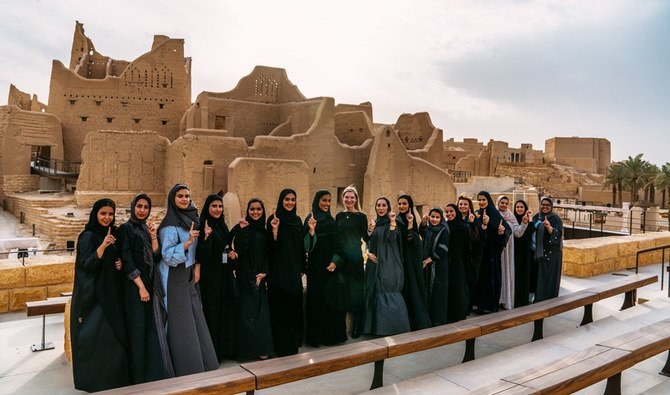JEDDAH: Saudi Arabia’s private and public sectors have been investing in training and mentoring programs to help boost women’s skills and careers. The idea of women’s empowerment has taken a center stage in most of the commercial and non-commercial entities in the Kingdom.
Past debates about whether women should join the workforce are over. The future is now.
Efforts are underway to support and empower female workers, so they can realize their true potential through training, reskilling and upskilling initiatives. According to the Cambridge dictionary, the term “upskilling” refers to the process of learning new skills or teaching workers new skills while “reskilling” is the process of learning new skills so workers can do a different job or instruct others on how to do a different job.
Saudi Arabia’s strong approach to women’s inclusivity in the workforce has provided many with the means to grow professionally in the private and government sectors. The new focus is on hiring those who fit the job description and can add to their skills. It is a critical strategy in the Kingdom’s ever-changing and growing employment landscape.
“I’ve always run initiatives to empower women whether that was in previous jobs or here in Saudi Arabia,” Danielle Atkins, the CMO at the Diriyah Gate Development Authority, told Arab News.
“My team’s success is a direct reflection on my own success. For me to come to Saudi and inspire a new generation of female leaders — that’s my benchmark of success,” Atkins said.
The Kingdom is determined to groom its female leaders while bringing out the passion, energy and enthusiasm of its workers. Atkins said DGDA is on a similar mission.
One of her protégées went on to become the company’s community management associate director. Ahlam Al-Thunayan, a native of Diriyah, is working within DGDA’s Community Engagement Department and is proud to be part of an all-female staff.
I’ve always run initiatives to empower women whether that was in previous jobs or here in Saudi Arabia.
Danielle Atkins, CMO at the Diriyah Gate Development Authority
“Each team member is strong and opinionated, and they are hard workers even though most are fresh graduates,” Al-Thunayan told Arab News.
DGDA has made strides in fields such as hospitality, culture and heritage, and tourism. Al-Thunayan noted that the firm focuses on each new employee’s skill set, and places them in the department best suited for them. The ongoing practice of reskilling increases growth opportunities, boosts performance, and helps the company stay competitive.
More than 40 percent of Saudi government workers are female as DGDA is playing a key role in employing women. Over half of the marketing team consists of women as the firm is also creating even more new roles within its establishment for female workers. Those who show potential and work at a high pace are selected for leadership development programs that help further their careers while also putting a focus on moving employees from one department to the next to upskill their staff.
Atkins’ advice for trainees and young graduates still new to the workforce is to do something they are passionate about.
Each team member is strong and opinionated, and they are hard workers even though most are fresh graduates.
Ahlam Al-Thunayan
“At the end of the day, you’ll excel if you are passionate,” she said. “When you are young and have not had a lot of experience in the workplace, having the opportunity to work in different departments under different leadership is a really good way to develop your skills. It also helps you understand where is the best place to grow and develop going forward.”
Reskilling and upskilling initiatives continue to help female workers rise to prominence.
Thekra Althaalabi started off as a warehouse employee at Al-Nahdi Medical Co. where she was responsible for performing an array of duties. After eight years with the company, she is now a warehouse shift and supply chain manager leading an all-female team.
“Just like everyone, I started at the very bottom,” Althaalabi told Arab News.
“Throughout my time working here, the company ensured that I received different types of training in processing incoming stock, time management, documentation and inventory workshops. The training has benefited me greatly.”
Starting off with nine female employees in 2012, the medical distribution division at the warehouse has since increased 80 women in different divisions across the supply chain. Althaalabi said employees were encouraged to take part in the different training programs that were available. Many have been able to put their training into practice and rise in ranks.
“The common feeling is that we, as female employees, have grown more confident in our jobs,” she said. “We are empowered, we have developed our skills within our area of expertise and we are improving employee capabilities.”






























